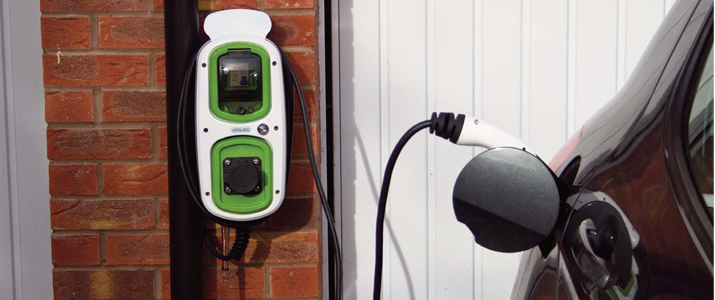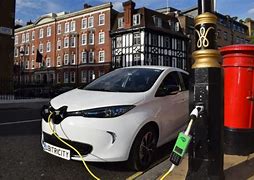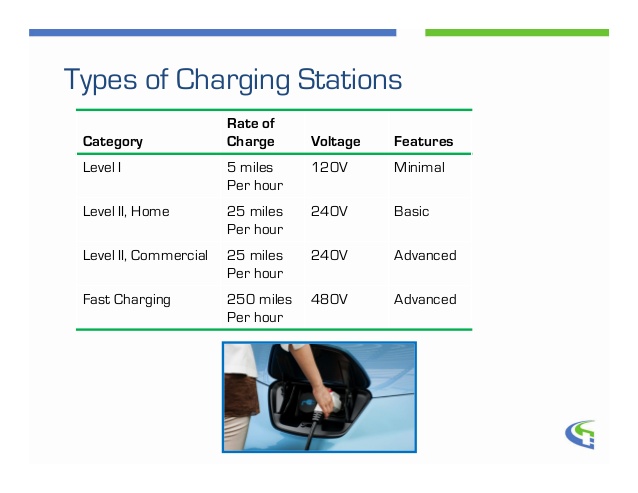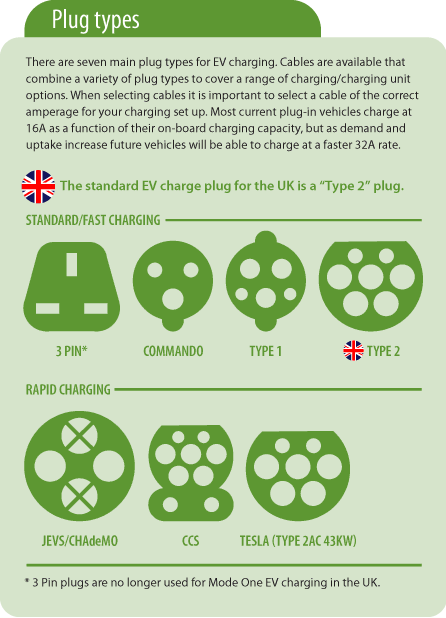Electric car charging – how it works and how much it costs
Filling up with fuel is easy, charging an electric car, however, seems a bit more complicated.
The different connectors, compatibility, and variable rates of charge can make it seem like a complex job.
But electric car charging need not be so confusing. So free yourself from the tangled mess of charging cables with this guide we’ve created in partnership with the Energy Saving Trust.
How to charge your electric car
There are three basic ways to charge an electric car: at home, at work, or at a public charging point.
Home charging

Want to start each day with a ‘full tank’? Charging each night at home will provide all the daily driving range the average driver will need.
You can charge using a regular domestic 3 pin socket, but a dedicated home EV charger is the better option by far.
Dedicated EV home chargers typically deliver around 7kW of power. In contract, most vehicle manufacturers limit the current drawn from a standard domestic 3 pin socket to 10A or less, which equates to a maximum of 2.3kW.
A 7kW home charger therefore delivers approximately three times as much power and is approximately three times as fast as using a domestic socket.
Home chargers are also much safer as they are designed to deliver that level of power over long periods.
The installation engineer will have checked that your property’s wiring and consumer unit are up to the required standard; a home charger also uses dedicated electric vehicle sockets that are more robust and weather proof than domestic 3 pin sockets.
How much does it cost to install an electric car charger at home?
The typical cost of a home charge point is around £400-500 installed by All Power Electrical.
Under its Electric Vehicle Homecharge Scheme, OLEV currently offers a grant of up to 75% of this cost, capped at a maximum grant of £350.
If you own or have primary access to an EV and off-street parking you may be eligible for an OLEV funded grant towards the cost of a home charge point.
Can I still charge my electric car from an ordinary 3 pin socket?
Yes, if you have the right lead to do so. However, it is better to use this option as a back-up rather than as a regular charging method.
This is because it usually involves running a 3-pin socket at 2.3kW, which is close to its maximum 3kW power rating, for hours at a time, which puts a lot of strain on a circuit.
It’ll be slow as well. For example, charging a fairly typical 40kWh EV battery from zero to 100% would take more than 17 hours.
Most EV owners therefore install a dedicated EV home charger which will typically deliver between 3.7 and 7kW of power, reducing charging times significantly compared to a 3 pin socket.
If you ever use an extension lead to charge an EV you must ensure it is rated at 13amps and fully unwound to prevent overheating.
Should I change my energy tariff at home if I get an EV?
Many electricity suppliers offer domestic tariffs designed for EV owners, which generally have cheaper night time rates which benefit overnight charging.
Workplace charging

Charging points at work help make electric cars viable for commuters who live further away from their homes.
If your work doesn’t have an electric vehicle charge point installed, it could take advantage of the Government’s Workplace Charging Scheme (WGS).
The WGS is a voucher-based scheme that provides a contribution towards the up-front costs of the purchase and installation of electric vehicle to the value of £300 per socket – up to a maximum of 20 sockets.
Employers can apply for vouchers using the Workplace Charging Scheme application.
Public charging

Public EV chargers can be found at service stations, car parks, supermarkets, cinemas, even just at the side of the road.
Public chargers at service stations fulfil the role of our current forecourts and are best suited for longer journeys, with a rapid charging unit providing up to 80% of charge in as little as 20-30 minutes.
The network of public chargers continues to grow at an incredible rate. Zap-Map reports a total of 31,737 charging points at 11,377 different locations nationwide at the time of writing (May 2020).
EV charging networks
There are a number of public EV charging networks in the UK, each one taking a slightly different approach to charger access.
Polar is the UK’s largest public charging network. Access is granted via an app or membership card, and is available as a pay-as-you-go or subscription service.
Ecotricity also asks its customers to register via an app, which is used to control the charging process.
Meanwhile, Tesla owners simply turn up at a Supercharger station and wait for their EV to be recharged.
There are regional charging networks too, but many of them also offer access to customers of larger EV networks.
If you are planning to rely on an EV charging network, make sure you’re signed up to the correct network for any chargers you’re planning on using: there are several resources that allow you to check ahead both for the location of chargers and the network running them.
How can I charge my car if I don’t have private parking?
If you don’t have private parking, an EV may still be a practical option for you particularly if you have charge points available at your place of work or if you have a public charger near to your home.
The RAC is the first breakdown assistance company in the UK to introduce a mobile charging unit for electric vehicle owners who have run out of charge. Find out more about RAC EV Boost.
- Electric cars – a definitive guide and tips for buyers
- Are electric cars really better for the environment?
- Buying a used car – the ultimate checklist
How much does it cost to charge an electric car?
To fully charge an electric car at home it costs around £5.
To charge an EV to 80% at a public rapid charger (the level you normally would here) it costs around £7 to £10.
Naturally, this varies depending on the location, tariff, energy cost, battery capacity, charging speed and charge level, but we can say for certain that charging an EV far undercuts fuel costs for a petrol or diesel car.
The above estimates were calculated using Zap-Map’s fantastic home charging calculator and public charging calculator.
For more detailed information on charging costs for specific vehicles and charge speeds, the Energy Saving Trust also has a breakdown here.
How long does it take to charge an electric car?

How long it takes to charge an EV depends on the size of the battery and the type of charger – which is defined by the power in kW.
Types of EV charging
Slow charging
From empty to 100%, slow charging typically takes around 5-8 hours for most EVs rising to around 12 hours for longer range cars with larger batteries.
Most EV charging takes place at home with dedicated chargers like these (for which a Government installation grant is available). Slow charging points are also commonly found at places of work.
These units are rated at 3 to 6kW.
Fast charging
A 7kW fast charger will charge an EV in 3-5 hours, while a 22kW unit could complete the task in a couple of hours.
You will find fast chargers in supermarket car parks, shopping centres or anywhere an electric car can be left for an extended period.
Rapid charging
Using a rapid charger typically takes around 45mins – 1 hour for an 80% charge, rising to around 1.5 hours for the longer range EVs with larger batteries.
They are commonly found at motorway service stations and close to major roads.
Rapid charge times are generally quoted to 80% charge because beyond this, the charging speed automatically tapers off to prevent battery damage.
However, even when rapid charging on a long journey you often won’t need to charge for this long. For example, 15 minutes of charging typically gives you a 30-40 mile range which you may know would be enough to complete your journey.
Rapid DC chargers usually provide up to 50kW of power, while rapid AC units are rated up to 43kW.
There are also DC-only ultra-rapid chargers which can charge at 100kW and above. Usually ultra-rapid chargers are 150kW, but they can get as high as 350kW.
Electric car chargers, connectors and adaptors

This is where things get slightly more complicated because there isn’t yet a universal connector for electric vehicles and the different chargers.
Each charger type (slow, fast and rapid) have their own set of connectors for low or high power, and for AC or DC charging.
Here is a list of every different type of connector within each category.
Slow charge connectors:
- 3-pin 3kW AC
- Type 1 3-6kW AC
- Type 2 3-6kW AC
- Commando 3-6kW AC
Fast charge connectors:
- Type 2 7-22kW AC
- Type 1 7kW AC
- Commando 7-22kW AC
Rapid charge connectors:
- CHAdeMo 50kW DC
- CCS 50-350kW DC
- Type 2 43kW AC
- Tesla Type 2 120kW DC
Source: Zap-Map
The last thing you want is to get to a charging station when your battery’s low, only to find it’s not compatible with your car’s charging input.
So always check the car’s handbook and the charging network provider’s website for more specific information.
Are all EVs compatible with all chargers?
Most EVs and EV chargers in the UK are compatible. But for non-rapid charging you will usually have to supply your own cable, which comes with and is stored inside the vehicle.
For non-rapid charging, EVs available in the UK will either have the above Type 1 inlet socket or Type 2 inlet socket.
Luckily your EV will be supplied with a cable that has the plug it requires, and at the infrastructure (charger) end, the cables are all compatible.
Rapid chargers use what are known as tethered cables i.e. they are permanently connected to and cannot be removed from the charging unit.
In the UK most rapid chargers have two cables providing the two most popular rapid charge connectors (CHAdeMO and CCS) so you simply select and use the one that fits your EV.
The Renault Zoe is the only EV sold in the UK that takes AC rapid charging which uses a different connector, but many rapid chargers will also have this available on a third tethered cable.
Tesla uses its own rapid chargers known as Tesla Super Chargers and these cannot be used by other types of EVs. Some Tesla ‘destination chargers’, found in hotel car parks and elsewhere, can be used by other EVs though.
How do I know which chargers my EV can use?
If you have an EV you will know – from your dealer, lease company, handbook etc – what type of charging ports it has.
The easiest way to find suitable public chargepoints is to use an app like Zap-Map which shows the chargepoints on a map.
Zap-map can be filtered by connector type, EV type or charging speed and it tells you if there are any reported problems with a charger.